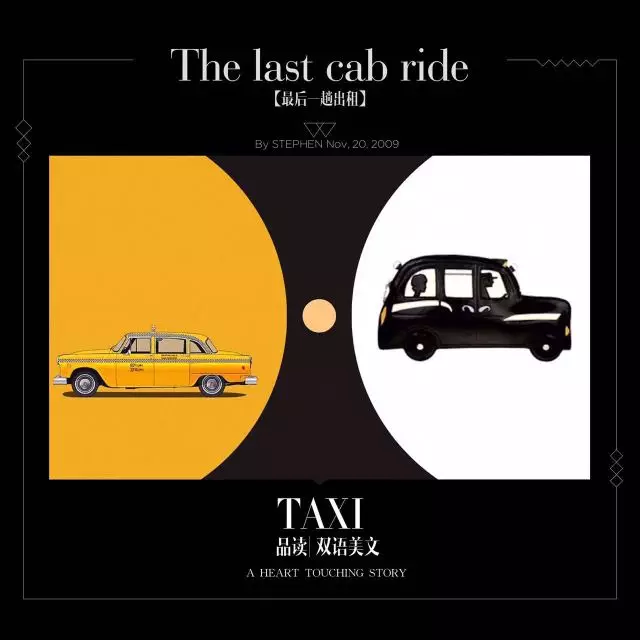Twenty years ago, I drove a cab for a living. One time I arrived in the middle of the night for a pick up at a building that was dark except for a single light in a ground floor window. Under these circumstances, many drivers would just honk once or twice, wait a minute, then drive away. But I had seen too many impoverished people who depended on taxis as their only means of transportation. Unless a situation smelled of danger, I always went to the door. This passenger might be someone who needs my assistance, I reasoned to myself. So I walked to the door and knocked.
二十年前,我以開出租車謀生。有一次半夜我為了接一名乘客來去到了一棟建筑處,那里黑漆漆的,只有底層的窗戶那有一盞燈是亮著的。在這樣的情況下,大多計程車司機可能只會按一兩下喇叭,等上一分鐘,然后便揚長而去。但是我曾經見過非常多貧困的人們,他們非常依賴計程車,把計程車當作是他們唯一的交通工具。除非是察覺到有危險的情況下,不然我經常會走到門邊。我總會這樣去想,或許這位乘客正需要我的幫助呢。所以我走到了門邊然后敲了敲門。
"Just a minute," answered a frail, elderly voice.I could hear something being dragged across the floor. After a long pause, the door opened. A small woman in her 80's stood before me. She was wearing a print dress and a pillbox hat with a veil pinned on it, like somebody out of a 1940s movie. By her side was a small nylon suitcase.
一分鐘后,我聽到了虛弱的應答聲,像是老人的聲音。我能夠聽到有東西在拖著地走。隔了很長一段時間后,門開了,站在我面前的是一位身材矮小,看上去有八十來歲的老婦人。她穿著一條印花連衣裙,帶了一個鑲有面紗的圓形女帽,看上去就好像從40年代的電影里面走出來的人一樣。手上還提著一個小型的尼龍箱。
The apartment looked as if no one had lived in it for years. All the furniture was covered with sheets. There were no clocks on the walls, no knickknacks or utensils on the counters. In the corner was a cardboard box filled with photos and glassware.
這棟公寓看上去已經多年沒人住過了。所有的家具都用被單蓋起來的。墻上沒有刮痕,柜臺上沒有任何裝飾和廚具。角落里放著一個裝有照片和玻璃器皿的紙箱。

"Would you carry my bag out to the car?" she said. I took the suitcase to the cab, then returned to assist the woman. She took my arm and we walked slowly toward the curb. She kept thanking me for my kindness. "It's nothing," I told her. "I just try to treat my passengers the way I would want my mother treated." "Oh, you're such a good boy," she said. When we got in the cab, she gave me an address, then asked, "Could you drive through downtown?"
“你可以幫我把箱子拿到車上去嗎?”她說。我把箱子拿到我的車上后,又返回來幫她。她攙扶著我的手臂,我們慢慢的向車子走去。她一直不停地對我的善意表示感謝,我對她說:“沒事,我只是試著用希望我母親也可以能到的對待方式來對待我的乘客。”“噢,你真是個好孩子,”她說。當我們到了出租車上后,她遞給我一個地址,然后問道:“請問你可以載我穿過這個城鎮嗎?”
"It's not the shortest way," I answered quickly. "Oh, I don't mind," she said. "I'm in no hurry. I'm on my way to a hospice." I looked in the rear view mirror. Her eyes were glistening. "I don't have any family left," she continued. "The doctor says I don't have very long." I quietly reached over and shut off the meter. "What route would you like me to take?" I asked.
“這不是最近的路線,”我急忙回答道。“噢,我不介意,”她說,“我不急,我是準備去臨終安養院。“我從后視鏡里看到,她的眼睛閃閃發光。”我沒有家人可以留戀,“她繼續說道,“醫生說我的時間不長了”。我很快便關掉了計價器。然后問她:“你想走哪條路線呢?”
For the next two hours, we drove through the city. She showed me the building where she had once worked as an elevator operator. We drove through the neighborhood where she and her husband had lived when they were newlyweds. She had me pull up in front of a furniture warehouse that had once been a ballroom where she had gone dancing as a girl.
接下來的兩個小時,我們開著車,在這個城市穿梭。她給我看她曾經作為一個開電梯的人員工作過的地方。我們穿過她和她丈夫新婚時曾經居住過的那一帶。在一家家具倉庫門前時她讓我減速停下,那里曾是一個舞廳,年輕時她還在那跳過舞。
Sometimes she'd ask me to slow in front of a particular building or corner and would sit staring into the darkness, saying nothing.As the first hint of sun was creasing the horizon, she suddenly said, "I'm tired. Let's go now." We drove in silence to the address she had given me.
有時候,經過某一棟建筑或者謀一個角落的時候,她會讓我減速,然后坐在車上凝望著那一片漆黑,卻什么也不說。當第一縷太陽光從地平面上升起的時候,她突然說:“我累了,我們走吧。”我們坐在車上,沉默不語,前往她給我的那個目的地。
It was a low building, like a small convalescent home, with a driveway that passed under a portico. Two orderlies came out to the cab as soon as we pulled up. They were solicitous and intent, watching her every move. They must have been expecting her. I opened the trunk and took the small suitcase to the door. The woman was already seated in a wheelchair.
那是一棟矮小的建筑,就好像是一個小型的康復醫院,門廊下有一條私人通道。我們的車一停,兩名醫院的護理人員就來到我們的車邊。他們關懷備至,專心致志看著這位老婦人的一舉一動。她們肯定一直都在等她。我打開后備箱,把她那個小箱子拿出來放到門邊。這位婦人已經坐在輪椅上了。
"How much do I owe you?" she asked, reaching into her purse. "Nothing," I said. "You have to make a living," she answered. "There are other passengers." Almost without thinking, I bent and gave her a hug. She held onto me tightly. "You gave an old woman a little moment of joy," she said. "Thank you." I squeezed her hand, then walked into the dim morning light. Behind me, a door shut. It was the sound of the closing of a life.
“我應該給你多少錢呢?”她拿出她的錢包并問道。“不用給了”我說。她繼續答道:“這是你的生計啊。”“還有其他的乘客呢”想都沒想,我彎腰給了她一個擁抱。她緊緊的抓著我并且說道:“你給了我這個老婦人一小段愉悅的時光,謝謝。”我緊握著她的手,然后在清晨那昏暗的光線中離去了。在我的身后,我聽到門關了,那是一個生命逝去的聲音。
I didn't pick up any more passengers that shift. I drove aimlessly, lost in thought. For the rest of that day, I could hardly talk. What if that woman had gotten an angry driver, or one who was impatient to end his shift? What if I had refused to take the run, or had honked once, then driven away? On a quick review, I don't think that I have done anything more important in my life. We're conditioned to think that our lives revolve around great moments. But great moments often catch us unaware—beautifully wrapped in what others may consider a small one.
在那一行程中,我沒有再接其他的乘客。我漫無目的的開著車,陷入沉思。在那一天剩余的時間里,我幾乎都沒說話。如果那位婦人遇見的是一位脾氣不好的司機,或者是一位沒有耐心去走完那一程的司機,情況會是怎么樣?如果我拒絕去接這次的行程,或者只是響一兩聲喇叭便把車開走,又會怎么樣?快速的回顧一下,我并不覺得自己做了生命中什么重要的事情。我們習慣這樣去想,我們的生命中是有那么些重大且難忘的瞬間。但是這樣一些瞬間也不常讓我們意識到——美好的事物往往就包裹在那些令他人看來微不足道的事情里面。











